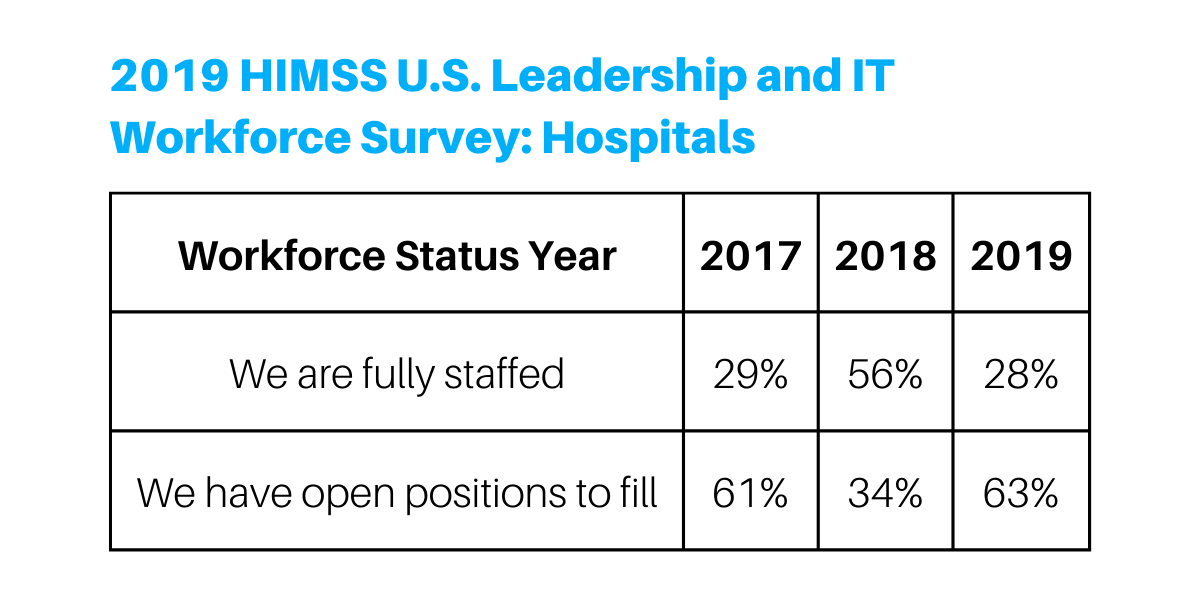
Staff Shortages: A looming problem in the fastest growing sector of our economy
The news is filled with articles about nursing and physician shortages. Much of what is written regarding solutions centers on travel nurses, nursing assistants, scribes, physician’s assistants, retention, and productivity software as solutions to the problem. However, there’s another looming shortage that impacts any productivity software solution that integrates with the EMR or any HIS for that matter: A shortage of IT personnel critical to implementing those solutions.
Articles illustrate the problem:
The Health IT Staffing Shortage Is a Problem Morphing Into a Crisis (hitconsultant.net)
Staffing shortages have plagued the healthcare industry for years, and this year hospital IT departments are feeling more pain than ever. The shortfall in physicians and nurses understandably gets the most press attention, but two phenomena are pushing scarcity of specialized IT workers into the stratosphere: computer and IT jobs across all industries are projected to grow 12% from 2018 to 2028, and healthcare is projected to add 3.5 million jobs during the period, about one-third of all new jobs — making it our largest sector. IT jobs are a big piece of that pie. Hospitals must plan ahead and be creative to overcome the stalled hiring efforts that will only worsen.
It’s real to my professional life. I recently had a discussion with a prospective client about our OCR-based productivity software. He confided in me that he was not able to move forward with the project. He said, “The issue is getting our HIMS and IT folks to support the necessary interfaces to allow your group to upload data.”
I’ve known that IT departments have been rate limiting factors in deploying software for years because of limited resources. However, this is the first time I’ve had a prospective client tell me that IT was responsible for causing the project to be rejected out of hand.
Good news for the two of us, he did note, “If we (Extract Systems) have a solution around this barrier, I’d love to revisit our conversation.” We can.
Throughout our previous conversations, we had never discussed what should have been top of mind when collaborating on options:
-
Can parts of the software be implemented and bring substantial benefit, without being integrated to the EMR or HIS?
-
What is the commitment required of IT to see the project portion requiring integration through implementation to go live? As well, what IT support will be needed on an annual basis once live?
Going forward, as part of my collaboration with prospective clients, I will add IT staff time requirements to my list of steps in getting a project approved. Blog: Getting Your Project Approved
-
Link to leadership’s strategic initiatives (pillars)
-
Address how it impacts leaderships’ Key Performance Indicators (KPIs)
-
Show how the project meets or exceeds financial return criteria Blog: Preparing the Financial Case for a Project
-
Highlight other functional areas’ (i.e. Revenue Rec., HIM, Nursing, Transplant, Physician, Laboratory, etc.) wins gained from your project
-
Address stake holders’ time requirements (inclusive of IT staff requirements). Examples include:
-
Project Manager
-
Interface Analyst
-
EMR Analyst
-
HIM/Doc Management System Admin
-
IT/Infrastructure/Database Admin
-
End Users
-
-
Address time to impact (inclusive of an implementation timeline)
-
Include measurement criteria and tools to assess impact
In today’s environment, projects are getting more and more difficult to get through the approval process. It’s essential to understand what will give our projects the best chance for approval and ultimately positively impact the health systems operations.



